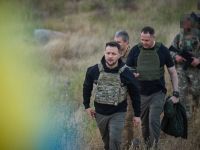Secretary of State Colin Powell on Monday said Iraq continues to defy the United Nations and it has "not much more time" to comply with disarmament demands if it wants to avert war.
"Iraq's refusal to disarm...still threatens international peace and security," Powell said after U.N. inspectors presented their progress report to the Security Council at U.N. headquarters in New York. "The inspectors' findings came as no surprise," Powell said.
He spoke at the State Department, after returning from a weekend trip to Switzerland where he addressed the World Economic Forum.
A senior U.S. official said Powell would provide new evidence sometime after a meeting Friday between Bush and British Prime Minister Tony Blair. The official told AP Bush was not expected to unveil any new evidence in Tuesday's State of the Union address, although he will outline the case against Saddam.
Powell said that the issue was "not how much more time the inspectors need to search in the dark. It is how much more time Iraq should be given to turn on the lights and come clean. ... Iraq's time for choosing peaceful disarmament is coming to an end."
The Bush administration dismissed Iraq cooperation as inadequate, and U.S. Ambassador John Negroponte said he had heard nothing that gave "any hope that Iraq will disarm" voluntarily.
Other Security Council members with the same veto power as the United States disagreed.
"The job has not been completed. We share the view of many that this process has not been completed and more time is needed," said China's deputy U.N. ambassador Zhang Yishan. Russian Ambassador Sergey Lavrov said his country strongly supported calls "for inspections to continue."
France's U.N. Ambassador Jean-Marc de la Sabliere also supported the need for inspections "to go forward...with the objective of Iraq's verifiable disarmament," adding that it could be "several weeks" or "a few months." He said there was strong backing in the 15-member council for additional time.
But Negroponte said the issue was no longer the inspections process. "The purpose of this exercise is not inspections but the disarmament of Iraq. Our quarrel is with Iraq's behavior in this process," he said.
In closed-door consultations after the reports, Negroponte pointedly asked Blix and ElBaradei how much time they needed to conclusively determine whether Iraq was complying with its obligations, diplomats told The Associated Press. The inspectors agreed to return to the council later Monday with answers to questions from several ambassadors although they said some information may have to wait until Wednesday's meeting.
Iraqi Ambassador Mohammed al-Douri defended his country's actions. "We open all doors to Mr. Blix and his team. If there is something, he will find it. We have no hidden reports at all."
ElBaradei, head of the International Atomic Energy Agency, said so far nuclear inspections of 106 sites had turned up nothing. "We have to date found no evidence that Iraq has revived its nuclear program since the elimination of the program in the 1990s. However, our work is steadily progressing and should be allowed to run its natural course.
"With our verification system now in place, barring exceptional circumstances and provided there is sustained proactive cooperation by Iraq, we should be able within the next few months to provide credible assurance that Iraq has no nuclear weapons program.
"These few months would be a valuable investment in peace because it could help avoid a war," ElBaradei told the Security Council.
Both Blix and ElBaradei complained that Iraqi scientists were not submitting to private interviews. But ElBaradei said the Iraqis were cooperating with his questions and said the process shouldn't be hampered by deadlines.
Blix and ElBaradei will update the council again on Feb. 14. (Albawaba.com)
© 2003 Al Bawaba (www.albawaba.com)







